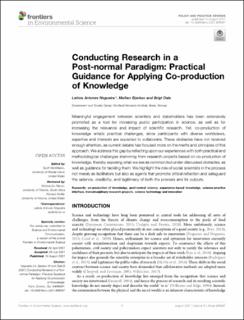| dc.contributor.author | Nogueira, Leticia Antunes | |
| dc.contributor.author | Bjørkan, Maiken | |
| dc.contributor.author | Dale, Brigt | |
| dc.date.accessioned | 2024-01-30T15:23:48Z | |
| dc.date.available | 2024-01-30T15:23:48Z | |
| dc.date.created | 2021-08-18T13:47:31Z | |
| dc.date.issued | 2021 | |
| dc.identifier.issn | 2296-665X | |
| dc.identifier.uri | https://hdl.handle.net/11250/3114653 | |
| dc.description.abstract | Meaningful engagement between scientists and stakeholders has been extensively promoted as a tool for increasing public participation in science, as well as for increasing the relevance and impact of scientific research. Yet, co-production of knowledge entails practical challenges, since participants with diverse worldviews, expertise and interests are expected to collaborate. These obstacles have not received enough attention, as current debate has focused more on the merits and principles of this approach. We address this gap by reflecting upon our experiences with both practical and methodological challenges stemming from research projects based on co-production of knowledge, thereby exposing what we see as common but under-discussed obstacles, as well as guidance for tackling them. We highlight the role of social scientists in the process not merely as facilitators but also as agents that promote critical reflection and safeguard the salience, credibility, and legitimacy of both the process and its outputs. | |
| dc.language.iso | eng | |
| dc.title | Conducting Research in a Post-normal Paradigm: Practical Guidance for Applying Co-production of Knowledge | |
| dc.type | Peer reviewed | |
| dc.type | Journal article | |
| dc.description.version | publishedVersion | |
| dc.source.volume | 9 | |
| dc.source.journal | Frontiers in Environmental Science | |
| dc.identifier.doi | https://doi.org/10.3389/fenvs.2021.699397 | |
| dc.identifier.cristin | 1926971 | |
| dc.relation.project | Framsenteret: Flagship Plastic in the Arctic 2019–2021 (Grant No. 469) | |
| cristin.ispublished | true | |
| cristin.fulltext | original | |
| cristin.qualitycode | 1 | |
